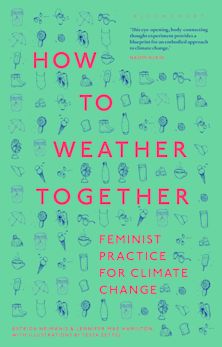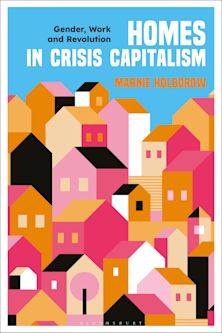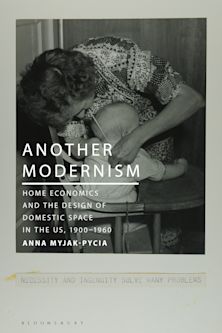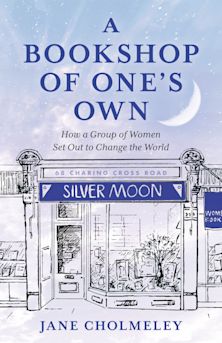- Home
- ACADEMIC
- Gender & Sexuality Studies
- Feminism
- Women in Late Life
This product is usually dispatched within 1 week
- Delivery and returns info
-
Free US delivery on orders $35 or over
You must sign in to add this item to your wishlist. Please sign in or create an account
Description
Contemporary old age is fraught with contradiction and complexity—women portrayed either as incompetent and cuddly grandmothers or as young women trapped in old bodies, images that rarely reflect how women actually see themselves. Women in Late Life explores the thorny issues related to gender and aging, including prevailing but problematic cultural expectations, body image, ageism, the experience of chronic illness, threats to Social Security and the very possibility of a secure retirement while challenging a long-term care system that disadvantages women.
Author Martha Holstein writes from a critical feminist perspective, drawing on her many years of experience in gerontology, as well as interviews and personal experience as a woman now in her seventies. The book highlights how women’s experience of late life is shaped by the effects of lifelong gender norms, by contemporary culture—from gender stereotypes to ageism—and by the political context. The book blends critique with proposals aimed at resisting damaging inequities resulting from being simultaneously old and a woman. She focuses on changes needed on multiple levels—societal, cultural, political, and individual. This interdisciplinary look at key questions around gender and aging is nuanced and beautifully written.
Table of Contents
The Women of Mayslake
Part I. The Body and Beyond
Chapter 1. What Do You See When You Look At Me?: Women, Aging, and Our Bodies
Chapter 2. Ageism: You’re Only as Old as You Feel and Other Fictions
Chapter 3. The “New Old Age”: From Productive Aging to Anti-Aging and Everything in Between
Chapter 4. Disruptions and Repair: Identity and Chronic Illness
Part II. Aging Women in Contemporary Society
Chapter 5: A Looming Dystopia: Feminism, Aging, and Community-Based Long-Term Care
Chapter 6: Retirement: In Pursuit of Women’s Economic Security
Chapter 7. Beyond Rational Control: Reflections on End-of-Life Care
Part III. I’m an Old Lady and Damn Proud of It (Maggie Kuhn)
Chapter 8. Resistance and Change: Where to From Here?
Product details
| Published | Mar 19 2015 |
|---|---|
| Format | Hardback |
| Edition | 1st |
| Extent | 316 |
| ISBN | 9781442222861 |
| Imprint | Rowman & Littlefield Publishers |
| Dimensions | 9 x 6 inches |
| Series | Diversity and Aging |
| Publisher | Bloomsbury Publishing |
About the contributors
Reviews
-
Holstein, a feminist scholar of aging, has written a compelling book about the distinctive challenges facing older women in the contemporary US. Older women share universal challenges ranging from biological aging to both subtle and overt ageism, yet their lived experiences vary widely based on their social locations—including race, social class, sexual orientation, (dis)ability status, and even physical appearance. The author integrates personal insights drawn from her experiences as a septuagenarian woman scholar with empirical social science research, critical gerontology theory, descriptions of cultural forces that (dis)empower older women, and informal interviews with the women of Mayslake, an independent living facility outside Chicago. The book builds on two additional themes. First, power informs both how one ages and the organization of resources, opportunities, and benefits afforded to older women. Second, ‘old’ should not be a devalued and stigmatized status, but one that is celebrated and respected. These themes set the foundation for substantive chapters on ageism, chronic illness, long-term care, retirement, end-of-life care, and activism. Holstein provides a thought-provoking and intimate tutorial into the lives and challenges of contemporary older women. Summing Up: Highly recommended. Upper-division undergraduates and above.
Choice Reviews
-
In many ways, this volume represents Martha Holstein’s tour de force as a feminist scholar of aging, as an activist, and as an ethicist. Here we have a beautifully written book that combines the personal and the political; it employs both interdisciplinary and critical gerontological and feminist perspectives. Holstein does not shy away from the complexities and challenges of aging, including end-of-life issues. Yet she also empowers us to take charge of our aging and to shape it despite the powerful ageist cultural messages that permeate our daily lives. Indeed, she gives us a template for disrupting dominant ways of thinking about old age, in general, and thinking about old women, in particular. . . .Those of us who teach aging courses to both undergraduates and graduates would do well to require our students to read this book—the content alone justifies this requirement, but there is an added bonus in that the author provides a superb and compelling model of feminist scholarship and writing. . . .In this book Martha Holstein has not only given us a comprehensive, critical, and bold exploration of gender and age, she has additionally provided us a template for how to bring about much needed change.
The Gerontologist
-
In her new book, Women in Late Life: Critical Perspectives on Gender and Age, author Martha Holstein has given educators, gerontologists, health professionals, and care-givers a beautifully written treatise on aging, women as we grow older (she’s reluctant to use the term 'old'), and gender and age as the political and cultural issues they are in today’s society….Women in Late Life is a valuable addition to the libraries of graduate students of gerontology, to healthcare providers in institutional, community and residential settings, to policy-makers in a variety of organizations serving women as they age, and to caregivers for women who are aging. The book is easily accessible without jargon or oppressive academic language, interspersed with engaging and authentic stories that bring life to the issues raised, and beautifully crafted for all audiences.
Educational Gerontology
-
Holstein’s outstanding book is eloquently argued, providing a novel critical and feminist perspective on gender and late life. Written by a feminist scholar, reflexive about her own aging, this carefully crafted, insightful book is destined to become a social science classic.
Sara Arber, Professor, Co-Director, Centre for Research on Ageing and Gender (CRAG), University of Surrey, UK
-
Holstein provides an unflinchingly critical examination of dominant culture’s construction of aging as a personal and moral responsibility to age “successfully.” Her treatment of the subject is thorough, providing discussions of both the construction’s resonance with the prevailing neoliberal political agenda and its numerous social and psychological costs, particularly for women. The book is a compelling and much-needed call for scholars and activists to challenge this construction and replace it with women’s diverse, honest stories that can collectively bring about social change.
Anne Barrett, Florida State University
-
When reading Martha Holstein’s book, I felt that for the first time I could see myself through the lens of aging, which is a frightening yet liberating thing to experience. As a female gerontologist approaching 50, I find myself struggling with culturally embedded issues of aging in ways that my formal research training had not prepared me for. Although I thought I knew some things about later life, this book reminded me that there are deeply rooted complexities tied to age that threaten personal identity on the personal and political level. Framed by strong critical theory, the personal insights lends an authenticity and immediacy to discussions of ageism, productivity, chronic illness, and other topics. I want all of my students to read this book so that they work to dismantle the fictions about later life and advocate for change.
Kate de Medeiros, professor of sociology and gerontology, Miami University



































